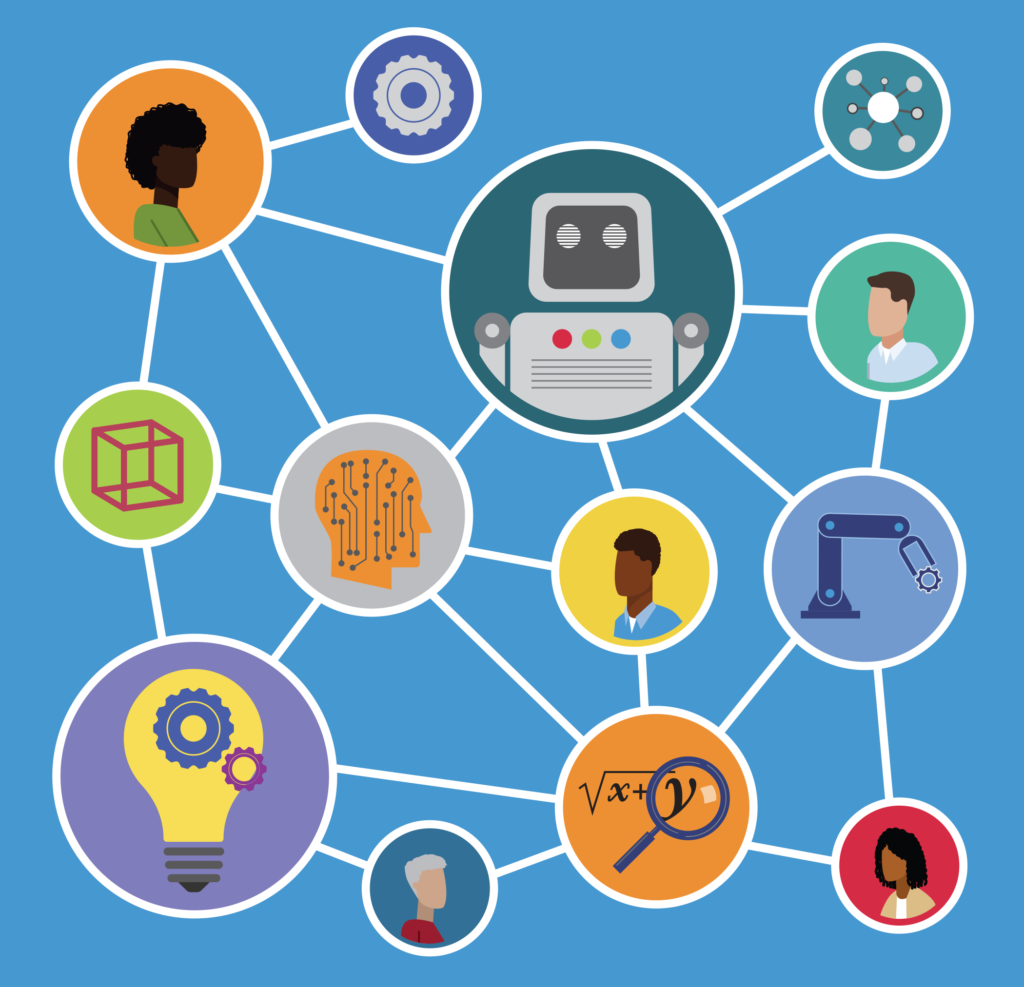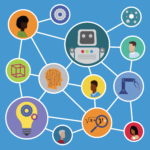Artificial intelligence (AI), machine learning, and related computational techniques have the potential to make powerful impacts on the future of learning. Technology’s impact on education is often to amplify impacts, regardless of whether the impacts are intended. Due to the accelerating pace of integration of technology in learning environments, the knob on the amplifier is rapidly going from low to high. Impacts on learning, whether positive or negative, could soon have consequences for many more students. Now is the time to begin planning for how to best develop and use AI in education in ways that are equitable, ethical, and effective and to mitigate weaknesses, risks, and potential harm.
We convened a panel of 22 experts in AI and in learning to address these issues. They met online for seven hours over two days in a facilitated process with different topics and breakout formats. The experts considered two broad questions:
- What will educational leaders need to know about AI in support of student learning in order to have a stronger voice in the future of learning, to plan for the future, and to make informed decisions?
- What do researchers need to tackle beyond the ordinary to generate the knowledge and information necessary for shaping AI in learning for the good?
This report introduces three layers that can frame the meaning of AI for educators. First, AI can be seen as “computational intelligence” and capability can be brought to bear on educational challenges as an additional resource to an educator’s abilities and strengths. Second, AI brings specific, exciting new capabilities to computing, including sensing, recognizing patterns, representing knowledge, making and acting on plans, and supporting naturalistic interactions with people. These specific capabilities can be engineered into solutions to support learners with varied strengths and needs, such as allowing students to use handwriting, gestures, or speech as input in addition to more traditional keyboard and pointer input. Third, AI can be used as a toolkit to enable us to imagine, study, and discuss futures for learning that don’t exist today. Experts voiced the opinion that the most impactful uses of AI in education have not yet been invented. The report enumerates important strengths and weaknesses of AI, as well as the respective opportunities and barriers to applying AI to learning.
Through discussions among experts about these layers, we observed new design concepts for using AI in learning. Experts discussed how AI could support learning in terms of orchestrating complex learning activities with multiple people and resources, augmenting human abilities in learning contexts, expanding naturalistic interactions among learners and with artificial agents, broadening the competencies that can be assessed, and revealing learning connections that are not easily visible. These approaches go beyond familiar design concepts for individualized, personalized, or adaptive learning. To bring these approaches to life, experts suggested two broad scenarios.
The learning environment scenario notably featured social learning. In this scenario, AI supports orchestration of the multiple types of activities, learning partners, and interaction patterns that can enrich a classroom. This is different from many older images of AI that focus on an isolated individual who interacts only through and with a single device. An AI agent could provide support to a group of students as they work on a project or assignment together. This could include support for students to work as team members (e.g., noticing, listening to, and building on each other’s contributions) as well as task supports that help them organize, manage, and connect their contributions to an overall group goal. It could adapt to what groups need to work well together, as well as how groups transition between individual work, small group work, and discussions with the whole classroom. This kind of AI system is socially aware, and can use social interaction with students as a way of bootstrapping their academic performance.
The assessment scenario envisioned going beyond what today’s assessments can measure. Instead of just grading an essay, an AI agent could help a teacher build a portrait of a student’s competencies. For example, AI can assess their writing, including students’ strengths and weaknesses, and provide suggestions for improvement that considers all the contexts in which the student does the writing. Teachers could, in turn, showcase other features of students’ writing experiences and accomplishments and build on these in instruction. This is fundamentally different from assessment metaphors today that focus on automated grading of a particular performance or diagnosing specific student errors. With added information about the student, the AI system can provide advice on how to support the learning process of that complete individual, based not only on their narrow test and class performance for a given class, but on their holistic background and trajectory.
The two scenarios connect. In a few years, it might become possible to connect learning with assessment as students collaborate to learn and learn to collaborate. A range of social, emotional, and cognitive skills might be better supported, going beyond the academic content typically measured today. Further, a focus on collaborative learning is just one way in which AI could enable powerful learning that aligns to how our society and its work are evolving.
We also noticed that, in terms of risks, the experts were obviously concerned with well-known risks related to data—such as privacy, security, bias, transparency, and fairness. But they also went beyond these expected concerns to talk about design risks and how poor design practices could unintentionally harm classes of users. In addition, they foresaw a major risk in not informing and involving educational policy makers and practitioners early and deeply enough.
The panel made seven recommendations for research priorities:
- Investigate AI Designs for an Expanded Range of Learning Scenarios
- Develop AI Systems that Assist Teachers and Improve Teaching
- Intensify and Expand Research on AI for Assessment of Learning
- Accelerate Development of Human-Centered or Responsible AI
- Develop Stronger Policies for Ethics and Equity
- Inform and Involve Educational Policy Makers and Practitioners
- Strengthen the Overall AI and Education Ecosystem
The expert panel was well aware that this meeting had limited involvement of other stakeholders and wanted to make clear that this was an initial discussion. They noted that the involvement of practitioners, policymakers, innovators, and industry in further discussions on these issues is imperative and that the experts would gladly participate with a broader set of stakeholders.
Acknowledgements
We are grateful to the 22 experts who participated in the panel: Dr. Russell Almond, Dr. Ryan Baker, Dr. Avron Barr, Dr. Gautam Biswas, Dr. Justine Cassell, John Cherniavsky, Dr. Sherice Clarke, Dr. Chris Dede, Dr. Sidney D’Mello, Dr. Janice Gobert, Dr. Cindy Hmelo-Silver, Dr. Susanne Lajoie, Dr. Diane Litman, Dr. Rose Lucklin, Dr. Maja Mataric, Dr. Danielle McNamara, Dr. Jaclyn Ocumpaugh, Dr. Amy Ogan, Dr. Zach Pardos, Dr. Brian Smith, Dr. Kurt Van Lehn, and Dr. Marcelo Worsley.
In addition, we thank the leaders from the National Science Foundation, Karen Marrongelle, Amy Baylor, and Tanya Korelsky; and from the U.S. Department of Education, Jake Steel, Bernadette Adams, along with participants Adam Safir, Kevin Johnstun, Sara Trettin, Christina Chhin, and Edward Metz; and our Digital Promise colleagues, Karen Cator, Barbara Means, Melissa Bellin, and Kasey Van Ostrand.
Finally, a special thank you to Erin Walker for helping to improve this report.
Suggested Citation
Roschelle, J., Lester, J. & Fusco, J. (Eds.) (2020). AI and the future of learning: Expert panel report [Report]. Digital Promise. https://circls.org/reports/ai-report.


